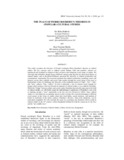| dc.contributor.author | Mahbub, Rifat | |
| dc.contributor.author | Shoily, Kazi Farzana | |
| dc.date.accessioned | 2016-11-08T05:23:35Z | |
| dc.date.available | 2016-11-08T05:23:35Z | |
| dc.date.copyright | 2016 | |
| dc.date.issued | 2016-10 | |
| dc.identifier.citation | Mahbub, R., & Shoily, K. F. (2016). The place of Pierre Bourdieu’s theories in (popular) cultural studies. BRAC University Journal, 11(01), 1–9. | |
| dc.identifier.issn | 1811-3079 | |
| dc.identifier.uri | http://hdl.handle.net/10361/6772 | |
| dc.description | This article was published in the BRAC University Journal [© 2016 Published by BRAC University] | en_US |
| dc.description.abstract | This article examines the relevance of French sociologist Pierre Bourdieu’s theories to cultural
studies. His key concepts such as cultural capital, habitus, field and symbolic violence are
introduced and explained in relation to their prospects and limitations in the study of culture. We
will argue that Bourdieu, though from a different vantage point than the key theoretical figures of
cultural studies such as Raymond Williams, questions the hierarchy of cultural productions and
consumptions. Importantly, his persistent argument that cultural productions (paintings, music and
theatres) accrue their symbolic and social value mainly through the social status of the users is
fundamental to how he challenges the hierarchy of the traditional notion of “high”, “low”, “elite”
and “mass” cultures. Thus, “culture” for him is inherently a site of constant social struggle for
change which perhaps is the key theoretical argument of cultural studies as an academic discipline.
While this “bridge” between culture and society makes Bourdieu theoretically important in the field
of cultural studies, we will further argue the methodological significance of Bourdieu’s own work
of studying people’s “taste” empirically in his key tract La Distinction (1984). Since cultural
studies as a discipline has an enduring interest in the everyday life of people belonging to different
social groups in the forms of studies about their food habits, spatial positions, and medium of
leisure in particular in the urban contexts, Bourdieu’s theories, when used adaptively, can be
particularly insightful. We will conclude this paper by examining why Bourdieu will be useful in
cultural studies in the 21st century’s urban Bangladesh defined by both the expansion of city lives
and the “new middle class”. | en_US |
| dc.format.extent | 9 pages | |
| dc.language.iso | en | en_US |
| dc.publisher | © 2016 Published by BRAC University | en_US |
| dc.subject | Pierre Bourdieu | en_US |
| dc.subject | Cultural studies | en_US |
| dc.subject | Culture | en_US |
| dc.subject | Social class | en_US |
| dc.subject | Bangladesh | en_US |
| dc.title | The place of Pierre Bourdieu's theories in (popular) cultural studies | en_US |
| dc.type | Article | en_US |
| dc.description.version | Published | |
| dc.contributor.department | English and Humanities, BRAC University | |

